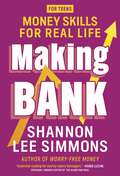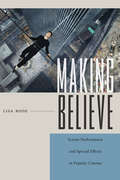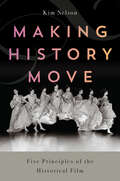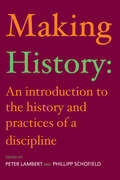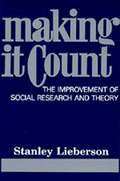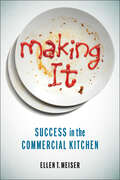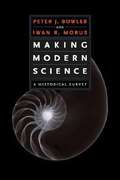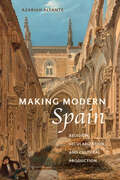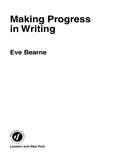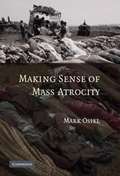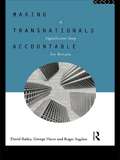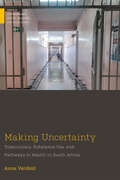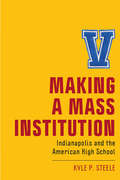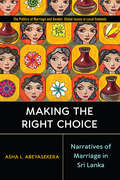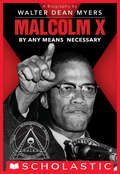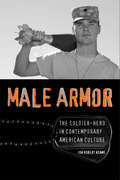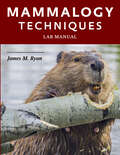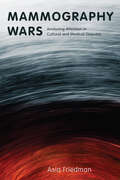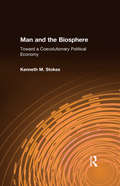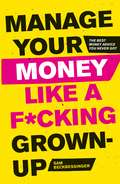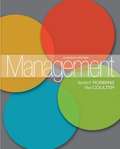- Table View
- List View
Making Bank: Money Skills for Real Life
by Shannon Lee SimmonsThe definitive young readers’ guide to tracking, saving, spending, enjoying and growing money“No one knows what money will be like when you grow up. But here’s the thing: life costs money. That has always been true and will still be true when you’re grown up. Whether you’re using babysitting money to buy takeout coffee with your pals today or trading digital tokens to buy an electric hovercar in twenty years, the same skills you must use to afford your Starbucks this week will be used tomorrow and every day after.Learn and practise just five skills around money today and you’ll be ready to take on the world, no matter how much things change in five years or fifty years. You got this.”Told through a series of conversations, helpful guides, easy tables and definitions, Making Bank invites young readers to discuss a subject that is easy to avoid: money. With her signature charm, Shannon Lee Simmons transforms the thornier aspects of finance into easy-to-understand concepts. Whether it’s figuring out how to save for a senior-year trip, wondering what the heck inflation is or trying to wrap your mind around credit, interest and crypto, Shannon approaches every subject with expertise and empathy. By focusing on how to track, save, spend, enjoy and grow their money, Making Bank rebuilds young readers’ relationship with it—one skill at a time.
Making Believe: Screen Performance and Special Effects in Popular Cinema
by Lisa BodeIn the past twenty years, we have seen the rise of digital effects cinema in which the human performer is entangled with animation, collaged with other performers, or inserted into perilous or fantastic situations and scenery. Making Believe sheds new light on these developments by historicizing screen performance within the context of visual and special effects cinema and technological change in Hollywood filmmaking, through the silent, early sound, and current digital eras. Making Believe incorporates North American film reviews and editorials, actor and crew interviews, trade and fan magazine commentary, actor training manuals, and film production publicity materials to discuss the shifts in screen acting practice and philosophy around transfiguring makeup, doubles, motion capture, and acting to absent places or characters. Along the way it considers how performers and visual and special effects crew work together, and struggle with the industry, critics, and each other to define the aesthetic value of their work, in an industrial system of technological reproduction. Bode opens our eyes to the performing illusions we love and the tensions we experience in wanting to believe in spite of our knowledge that it is all make believe in the end.
Making History Move: Five Principles of the Historical Film
by Kim NelsonMaking History Move: Five Principles of the Historical Film builds upon decades of scholarship investigating history in visual culture by proposing a methodology of five principles to analyze history in moving images in the digital age. It charts a path to understanding the form of history with the most significant impact on public perceptions of the past. The book develops insights across these fields, including philosophical considerations of film and history, to clarify the form and function of history in moving images. It addresses the implications of the historical film on public historical consciousness, presenting criteria to engage and assess the truth status of depictions of the past. Each chapter offers a detailed aspect of this methodology for analyzing history in moving images. Together, they propose five principles to organize past and future scholarship in this vital, interdisciplinary field of study.
Making History: An Introduction to the History and Practices of a Discipline
by Peter Lambert Phillipp SchofieldMaking History offers a fresh perspective on the study of the past. It is an exhaustive exploration of the practice of history, historical traditions and the theories that surround them. Discussing the development and growth of history as a discipline and of the profession of the historian, the book encompasses a huge diversity of influences, organized around the following themes: the professionalization of the discipline the most significant movements in historical scholarship in the last century, including the Annales School the increasing interdisciplinary trends in scholarship theory in historical practice including Marxism, post-modernism and gender history historical practice outside the academy. The volume offers a coherent set of chapters to support undergraduates, postgraduates and others interested in the historical processes that have shaped the discipline of history.
Making It Count: The Improvement of Social Research and Theory
by Stanley LiebersonThere were many failures before humans successfully learned to fly. After watching birds flap their wings, bold and adventurous individuals built huge winglike structures, leaped off cliffs, flapped their wings vigorously, and broke their necks. There are principles of flight to be learned from watching the birds all right, but the wrong analogy had been drawn. In similar fashion, our empirical approach to social behavior is based on an analogy.
Making It: Success in the Commercial Kitchen
by Ellen T. MeiserThe restaurant industry is one of the few places in America where workers from lower-class backgrounds can rise to positions of power and prestige. Yet with over four million cooks and food-preparation workers employed in America’s restaurants, not everyone makes it to the high-status position of chef. What factors determine who rises the ranks in this fiercely competitive pressure-cooker environment? Making It explores how the career path of restaurant workers depends on their accumulation of kitchen capital, a cultural asset based not only on their ability to cook but also on how well they can fit into the workplace culture and negotiate its hierarchical structures. After spending 120 hours working in a restaurant kitchen and interviewing fifty chefs and cooks from fine-dining establishments and greasy-spoon diners across the country, sociologist Ellen Meiser discovers many strategies for accumulating kitchen capital. For some, it involves education and the performance of expertise; others climb the ranks by controlling their own emotions or exerting control over coworkers. Making It offers a close and personal look at how knowledge, power, and interpersonal skills come together to determine who succeeds and who fails in the high-pressure world of the restaurant kitchen.
Making Medical Decisions for the Profoundly Mentally Disabled
by Norman L. CantorNorman Cantor analyzes the legal and moral status of people with profound mental disabilities -- those with extreme cognitive impairments that prevent their exercise of medical self-determination. He proposes a legal and moral framework for surrogate medical decision making on their behalf. The issues Cantor explores will be of interest to professionals in law, medicine, psychology, philosophy, and ethics, as well as to parents, guardians, and health care providers who face perplexing issues in the context of surrogate medical decision making. The profoundly mentally disabled are thought by some moral philosophers to lack the minimum cognitive ability for personhood. Countering this position, Cantor advances both theoretical and practical arguments for according them full legal and moral status. He also argues that the concept of intrinsic human dignity should have an integral role in shaping the bounds of surrogate decision making. Thus, he claims, while profoundly mentally disabled persons are not entitled to make their own medical decisions, respect for intrinsic human dignity dictates their right to have a conscientious surrogate make medical decisions on their behalf. Cantor discusses the criteria that bind such surrogates. He asserts, contrary to popular wisdom, that the best interests of the disabled person are not always the determinative standard: the interests of family or others can sometimes be considered. Surrogates may even, consistent with the intrinsic human dignity standard, sometimes authorize tissue donation or participation in non-therapeutic medical research by profoundly disabled persons. Intrinsic human dignity limits the occasions for such decisions and dictates close attention to the preferences and feelings of the profoundly disabled persons themselves. Cantor also analyzes the underlying philosophical rationale that makes these decision-making criteria consistent with law and morals.
Making Modern Science: A Historical Survey
by Peter J. Bowler Iwan R. MorusA textbook about the history of modern science with cross-references. The book is divided into two parts, one on episodes, the other on themes. It covers all major developments in scientific thinking--evolutionism, genetics, nuclear physics, and modern cosmology.
Making Modern Spain: Religion, Secularization, and Cultural Production (Campos Ibéricos: Bucknell Studies in Iberian Literatures and Cultures)
by Azariah AlfanteIn this elegantly written study, Alfante explores the work of select nineteenth-century writers, intellectuals, journalists, politicians, and clergy who responded to cultural and spiritual shifts caused by the movement toward secularization in Spain. Focusing on the social experience, this book probes the tensions between traditionalism and liberalism that influenced public opinion of the clergy, sacred buildings, and religious orders. The writings of Cecilia Böhl de Faber (Fernán Caballero), Gustavo Adolfo Bécquer, Benito Pérez Galdós, and José María de Pereda addressed conflicts between modernizing forces and the Catholic Church about the place of religion and its signifiers in Spanish society. Foregrounding expropriation (government confiscation of civil and ecclesiastical property) and exclaustration (the expulsion of religious communities), and drawing on archival research, the history of disentailment, cultural theory, memory studies, and sociology, Alfante demonstrates how Spain’s liberalizing movement profoundly influenced class mobility and faith among the populace.
Making Progress in Writing
by Eve BearneChildren's achievements in writing lag behind their achievements in reading, speaking and listening. National tests are beginning to expose this gap and inevitably, it is raising concerns. The issue is not without controversy but regardless of the politics of the situation, national progress in children's writing is both needed and possible.This new book from Eve Bearne makes a valuable contribution towards helping teachers close this gap. Uniquely, it follows the structure of the National Literacy Strategy, whilst examining key areas such as bridging KS2 and KS3 writing, and writing skills beyond the Literacy Hour. Such a structure makes the book incredibly practical and easy to use, providing essential information for both practitioners and academics.
Making Sense of Mass Atrocity
by Mark Osiel"Who done it?" is not the first question that comes to mind when one seeks to make sense of mass atrocity. So brazen are the leader-culprits in their apologetics for the harms, so wrenching the human destruction clearly wrought, meticulously documented by many credible sources. Yet in legal terms, mass atrocity remains disconcertingly elusive. The perversity of its perpetrators is polymorphic, impeding criminal courts from tracing true lines of responsibility in ways intelligible through law's pre-existing categories, designed with simpler stuff in mind. Genocide, crimes against humanity, and the worst war crimes are possible only when the state or other organizations mobilize and coordinate the efforts of many people. Responsibility for mass atrocity is therefore always widely shared, often by thousands. Yet criminal law, with its liberal underpinnings, insists on blaming particular individuals for isolated acts. Is such law therefore constitutionally unable to make any sense of the most catastrophic conflagrations of our time? Drawing on the experience of several recent prosecutions (both national and international), this book trenchantly diagnoses law's limits at such times and offers a spirited defense of its moral and intellectual resources for meeting the vexing challenge of holding anyone criminally accountable for mass atrocity. Just as today's war criminals develop new methods of eluding law's historic grasp, so criminal law flexibly devises novel responses to their stratagems. Mark Osiel examines several such recent legal innovations in international jurisprudence and proposes still others.
Making Sense of Statistics: A Conceptual Overview, Fifth Edition
by Fred PyrczakAn overview of descriptive and inferential statistics without formulas and computations. Clear and to-the-point narrative makes this short book perfect for all courses in which statistics are discussed. Helps statistics students who are struggling with the concepts. Shows them the meanings of the statistics they are computing.
Making Supervision Work for You: A Student's Guide (SAGE Study Skills Series)
by Jerry Wellington'Amongst the plethora of advice and guidance books and articles now available for postgraduate researchers, I would advise my students to select this one as providing insight not simply on what to do but also on why and how in relation to developing an effective working relationship with their supervisors. Since it addresses most of the new demands emerging in the doctoral world as well as those standard ones that have impacted previously, I would also recommend it to new or less experienced supervisors' - Professor Pam Denicolo, University of Reading Making Supervision Work For You discusses the entire supervision process from the student's perspective, as well as considering the supervisor's viewpoint and constraints. The author covers all phases of the student's 'journey', from induction through to final completion and examination of the thesis and the viva voce. The book illustrates many of the key issues in supervision by drawing upon extensive material from recent interviews with a range of supervisors and students. This book presents new ideas, regulations and codes of practice, and offers practical suggestions for students. It emphasizes students' experiences and needs, whilst also maintaining a focus on the supervisor's perspective and the demands of assessment at post-graduate level. The book is primarily aimed at Post-graduate students but will also be useful for undergraduates in their final year and equally for new or experienced supervisors. Jerry Wellington is a widely published author. He is professor in the School of Education at the University of Sheffield, with extensive experience of supervision, internal and external examining. SAGE Study Skills are essential study guides for students of all levels. From how to write great essays and succeeding at university, to writing your undergraduate dissertation and doing postgraduate research, SAGE Study Skills help you get the best from your time at university.
Making Transnationals Accountable: A Significant Step for Britain
by David Bailey Roger Sugden George HarteFirst published in 1994. Routledge is an imprint of Taylor & Francis, an informa company.
Making Uncertainty: Tuberculosis, Substance Use, and Pathways to Health in South Africa (Medical Anthropology)
by Anna VersfeldIn Cape Town, South Africa, many people with tuberculosis also use substances. This sets up a seemingly impossible problem: People who use substances are at increased risk of tuberculosis disease; and substance use seems to result in erratic behavior that makes successful treatment of people affected by tuberculosis extremely difficult. People affected don’t get healthy, healthcare providers are frustrated, and families seek to balance love and care for those who are ill with self-protection. How are we to understand this? Where does the responsibility for poor health and healing lie? What are the possibilities for an effective healthcare response? Through a close look at lives and care, Making Uncertainty: Tuberculosis, Substance Use, and Pathways to Health shows how patterns of substance use, tuberculosis disease, and their interaction are shaped by history, social context, and political economy. This, in turn, generates new perspectives on what makes poor health, and what good care might look like.
Making Waves
by Cassandra KingThe first novel by the author of acclaimed national bestseller The Sunday Wife, now reissued in paperback.In a small Alabama town in Zion County, life is finally looking up for 20-year-old Donnette Sullivan. Having just inherited her aunt's old house and beauty shop, she's taken over the business. Her husband, Tim, recently crippled in an accident, is beginning to cope not only with his disability but also with the loss of his dreams. Once a promising artist who gave up art for sports, Tim paints a sign for Donnette's new shop, Making Waves, that causes ripples throughout the small southern community. In a sequence of events--sometimes funny, sometimes tragic--the lives of Donnette, Tim, and others in their small circle of family and friends are unavoidably affected. Once the waves of change surge through Zion County, the lives of its people are forever altered.
Making a Mass Institution: Indianapolis and the American High School (New Directions in the History of Education)
by Kyle P. SteeleMaking a Mass Institution describes how Indianapolis, Indiana created a divided and unjust system of high schools over the course of the twentieth century, one that effectively sorted students geographically, economically, and racially. Like most U.S. cities, Indianapolis began its secondary system with a singular, decidedly academic high school, but ended the 1960s with multiple high schools with numerous paths to graduation. Some of the schools were academic, others vocational, and others still for what was eventually called “life adjustment.” This system mirrored the multiple forces of mass society that surrounded it, as it became more bureaucratic, more focused on identifying and organizing students based on perceived abilities, and more anxious about teaching conformity to middle-class values. By highlighting the experiences of the students themselves and the formation of a distinct, school-centered youth culture, Kyle P. Steele argues that high school, as it evolved into a mass institution, was never fully the domain of policy elites, school boards and administrators, or students, but a complicated and ever-changing contested meeting place of all three.
Making the Right Choice: Narratives of Marriage in Sri Lanka (Politics of Marriage and Gender: Global Issues in Local Contexts)
by Asha L. AbeyasekeraMaking the Right Choice unravels the entangled relationship between marriage, morality, and the desire for modernity as it plays out in the context of middle-class status concerns and aspirations for upward social mobility within the Sinhala-Buddhist community in urban Sri Lanka. By focusing on individual life-histories spanning three generations, the book illuminates how narratives about a gendered self and narratives about modernity are mutually constituted and intrinsically tied to notions of agency. The book uncovers how "becoming modern" in urban Sri Lanka, rather than causing inter-generational conflict, is a collective aspiration realized through the efforts of bringing up educated and independent women capable of making "right" choices. The consequence of this collective investment is a feminist conundrum: agency does not denote the right to choose, but the duty to make the "right" choice; hence agency is experienced not as a sense of "freedom," but rather as a burden of responsibility.
Malcolm X (Scholastic Focus): By Any Means Necessary
by Walter Dean MyersA classic and highly acclaimed biography of civil rights activist Malcolm X, ever more relevant for today's readers.As a 14-year-old he was Malcolm Little, the president of his class and a top student. At 16 he was hustling tips at a Boston nightclub. In Harlem he was known as Detroit Red, a slick street operator. At 19 he was back in Boston, leading a gang of burglars. At 20 he was in prison.It was in prison that Malcolm Little started the journey that would lead him to adopt the name Malcolm X, and there he developed his beliefs about what being black means in America: beliefs that shook America then, and still shake America today.Few men in American history are as controversial or compelling as Malcolm X. In this Coretta Scott King Honor Book, Walter Dean Myers, winner of a Newbery Honor and four-time Coretta Scott King Award winner, portrays Malcolm X as prophet, dealer, convict, troublemaker, revolutionary, and voice of black militancy.
Male Armor: The Soldier-hero in Contemporary American Culture (Cultural Frames, Framing Culture)
by Jon Robert AdamsThere is no shortage of iconic masculine imagery of the soldier in American film and literature--one only has to think of George C. Scott as Patton in front of a giant American flag, Sylvester Stallone as Rambo, or Burt Lancaster rolling around in the surf in From Here to Eternity. In Male Armor, Jon Robert Adams examines the ways in which novels, plays, and films about America's late-twentieth-century wars reflect altering perceptions of masculinity in the culture at large. He highlights the gap between the cultural conception of masculinity and the individual experience of it, and exposes the myth of war as an experience that verifies manhood.Drawing on a wide range of work, from the war novels of Ernest Hemingway, Norman Mailer, James Jones, and Joseph Heller to David Rabe's play Streamers and Anthony Swofford's Jarhead, Adams examines the evolving image of the soldier from World War I to Operation Desert Storm. In discussing these changing perceptions of masculinity, he reveals how works about war in the late twentieth century attempt to eradicate inconsistencies among American civilian conceptions of war, the military's expectations of the soldier, and the soldier's experience of combat. Adams argues that these inconsistencies are largely responsible not only for continuing support of the war enterprise but also for the soldiers' difficulty in reintegration to civilian society upon their return. He intends Male Armor to provide a corrective to the public's continued investment in the war enterprise as a guarantor both of masculinity and, by extension, of the nation.
Mammalogy Techniques Lab Manual
by James M. RyanGet outside! A hands-on lab manual for instructors incorporating fieldwork into their courses on mammalogy.Mammals inhabit nearly every continent and every sea. They have adapted to life underground, in the frozen Arctic, the hottest deserts, and every habitat in-between. In Mammalogy Techniques Lab Manual—the only field manual devoted to training the next generation of mammalogists—biologist and educator James M. Ryan details the modern research techniques today’s professionals use to study mammals wherever they are found.Ideal for any mammalogy or wildlife biology course, this clear and practical guide aids students by getting them outside to study mammals in their natural environments. Twenty comprehensive chapters cover skull and tooth identification, radio and satellite GPS tracking, phylogeny construction, mark and recapture techniques, camera trapping, museum specimen preparation, optimal foraging, and DNA extraction, among other topics. Each chapter includes several exercises with step-by-step instructions for students to collect and analyze their own data, along with background information, downloadable sample data sets (to use when it is not practical to be out in the field), and detailed descriptions of useful open-source software tools.This pragmatic resource provides students with real-world experience practicing the complex techniques used by modern wildlife biologists. With more than 60 applied exercises to choose from in this unique manual, students will quickly acquire the scientific skills essential for a career working with mammals.
Mammography Wars: Analyzing Attention in Cultural and Medical Disputes (Critical Issues in Health and Medicine)
by Asia FriedmanMammography is a routine health screening performed forty million times each year in the United States, yet it remains one of the most deeply contested topics in medicine, with national health care organizations supporting conflicting guidelines. In Mammography Wars, sociologist Asia Friedman examines cultural and medical disagreements over mammography. At issue is whether to screen women under age fifty, which is rooted in deeper questions about early detection and the assumed linear and progressive development of breast cancer. Based on interviews with doctors and scientists, interviews with women ages 40 to 50, and newspaper coverage of mammography, Friedman uses the sociology of attention to map the cognitive structure of the “mammography wars,” offering insights into the entrenched nature of debates over mammography that often get missed when applying a medical lens. Friedman’s analysis also suggests the sociology of attention’s unique potential for analyzing cultural conflicts beyond mammography, and even beyond medicine.
Man and the Biosphere: Toward a Coevolutionary Political Economy
by Kenneth M. StokesThis four-part monograph traces the dialectical development of economic thought from the Physiocrats through Marx to the present. It is a broad treatment of the history of intellectual thought that bridges economic and the social sciences on the one hand, with natural science and biology in particular on the other. The author is concerned with systems theory and treats the economy from the perspective of the biophysical thermodynamic dimensions of the economic processes. He closes his analysis with a discussion of organizational theory that relates to the formation of institutions and the issues of freedom in a technically dominated society. The book comes full circle in examining the moral and ethical concerns that first influenced the Physiocrats and other founding fathers of economic science.
Manage Your Money Like a F*cking Grown-Up: The Best Money Advice You Never Got
by Sam BeckbessingerYou're going to earn plenty of money over your lifetime. Are you going to waste it on stupid crap that doesn't make you happy, or let it buy your freedom and your most audacious dreams?We never get an instruction manual about how money works. Most of what we learn about money comes from advertising or from other people who know as little as we do. No wonder we make such basic mistakes. No wonder we feel disempowered and scared. No wonder so many of us just decide to stick our heads in the damn sand and never deal with it. In Manage Your Money Like a F*cking Grown Up, Sam Beckbessinger tells it to you straight: how to take control of your money to take control of your life.In this clear and engaging basic guide to managing your finances, you will learn: - How to trick your dumb brain into saving more, without giving up fun- How to make a bona fide grown-up budget- Why you need to forget what you've learned about credit- How to negotiate a raise- Why buying a house (probably) won't make you rich- The one super-simple investment you needWith helpful exercises, informative illustrations (also: kittens) and straightforward advice, this book doesn't shy away from the psychology of money, and is empowering, humorous and helpful. The book you wish you'd had at 25, but is never too late to read.
Management (11th Edition)
by Stephen P. Robbins Mary K. CoulterThis bestselling principles text vividly illustrates management theories by incorporating the perspectives of real-life managers. Management and Organizations; Understanding Management's Context: Constraints and Challenges; Managing in a Global Environment; Managing Diversity; Managing Social Responsibility and Ethics; Managing Change and Innovation; Managers as Decision Makers; Foundations of Planning; Strategic Management; Basic Organizational Design; Adaptive Organizational Design; Managing Human Resources; Managing Teams; Understanding Individual Behavi Managers and Communication; Motivating Employees; Managers as Leaders; Introduction to Controlling; Managing Operations For current managers or other industry professionals looking to gain REAL insight on management theory.
